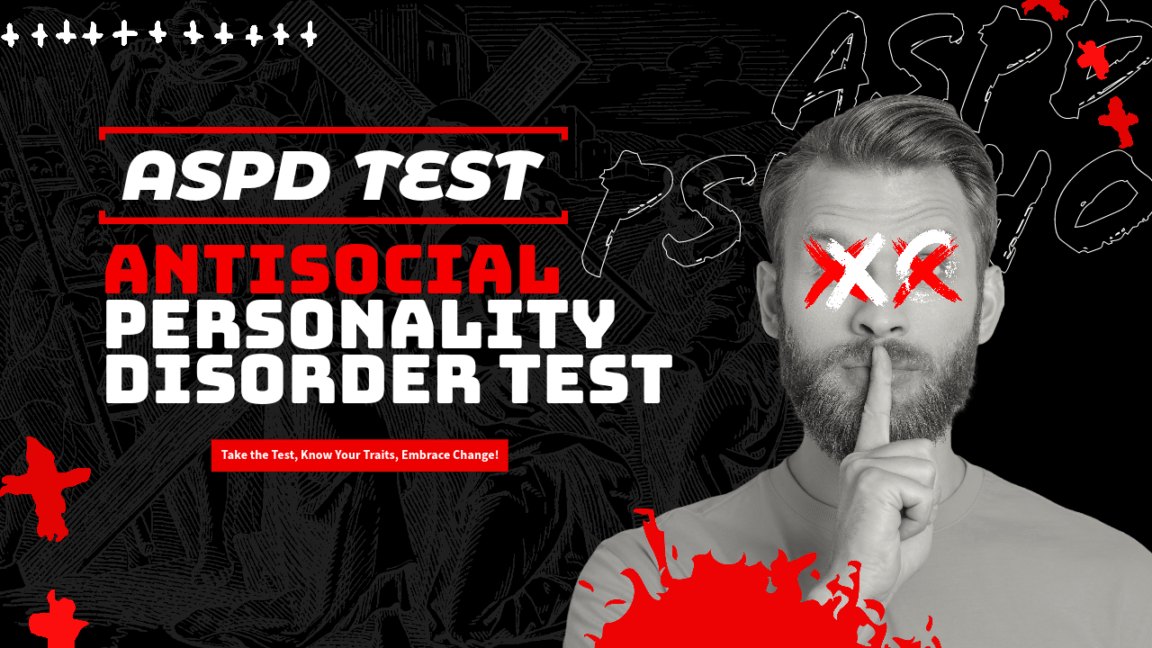Millions struggle with understanding whether their behavioral patterns align with Antisocial Personality Disorder (ASPD), a chronic mental condition characterized by disregard for societal norms and the rights of others. We’ve designed a 15-question antisocial personality disorder test to respond to this pervasive issue, promising a simple yet insightful glimpse into your behavioral traits. This user-friendly self-assessment tool aims to enlighten you on your behavioral tendencies while ensuring your peace of mind through recommendations for positive change.
How the Antisocial Personality Disorder Test Works
This test comprises 15 questions to which you respond with Never, Rarely, Sometimes, Often, or Very Often. Each response correlates with a score, leading to a result based on your cumulative score, indicating the likelihood that you exhibit traits associated with ASPD.
Interpreting Your Test Results
Post-completion, your cumulative score will determine your standing on the spectrum of antisocial personality traits. It’s crucial to approach this test honestly to attain the most accurate representation of your behavioral patterns.
Scoring is assigned as follows:
- Never: 0 points
- Rarely: 1 point
- Sometimes: 2 points
- Often: 3 points
- Very Often: 4 points
Results are categorized into the following:
- 0-15: No noticeable antisocial traits.
- 16-30: Mild antisocial traits.
- 31-45: Moderate antisocial traits.
- 46-60: Significant antisocial traits.
- 61-75: Severe antisocial traits.
While these recommendations are designed to provide guidance based on your score, they are not a substitute for a professional diagnosis. If you have concerns about possible Antisocial Personality Disorder, please consult with a licensed mental health professional or a clinical psychologist.
Recommendations to Prevent it:
Recognizing and addressing potentially antisocial traits is pivotal for personal development and maintaining healthy relationships. Regular self-reflection, maintaining open dialogues about behavioral concerns, seeking guidance from professional psychologists, and leveraging resources like therapy and counseling are viable pathways to modify harmful behavior.
Dr. Robert Hare, a foremost expert in psychopathy, suggests that learning more about antisocial personality disorder and actively engaging in empathy-building exercises can be transformative in promoting emotional understanding and enhancing interpersonal relationships.
Important Note:
This test is not a substitute for a professional diagnosis. Suppose you are concerned about the possibility of having antisocial personality disorder. In that case, seeking advice and a proper diagnosis from a licensed mental health professional or a clinical psychologist is crucial.
Instructions:
- Answer all 15 questions honestly.
- Our system will tally your scores based on your responses.
- Refer to the ‘Scoring is assigned as follows’ section to interpret your results.
- Consider the provided recommendations based on your score.
Disclaimer
This Antisocial Personality Disorder Test and its results are intended for informational purposes only. They should not be considered a formal diagnosis. A professional assessment is necessary for a conclusive diagnosis of Antisocial Personality Disorder. If you’re experiencing distress or discomfort, please get in touch with a mental health professional or counselor.
Explore More About Yourself By Trying Other Cluster B Personality Disorder Test
- Question of
I disregard the rights of others.
- Never
- Rarely
- Sometimes
- Often
- Very Often
Correct Wrong
- Question of
I engage in deceitfulness, such as lying or conning others for personal gain.
- Never
- Rarely
- Sometimes
- Often
- Very Often
Correct Wrong
- Question of
I act impulsively and fail to plan ahead.
- Never
- Rarely
- Sometimes
- Often
- Very Often
Correct Wrong
- Question of
I exhibit irritability and aggressiveness, getting into physical fights or assaulting others.
- Never
- Rarely
- Sometimes
- Often
- Very Often
Correct Wrong
- Question of
I consistently act irresponsibly and fail to fulfill work obligations.
- Never
- Rarely
- Sometimes
- Often
- Very Often
Correct Wrong
- Question of
I demonstrate a lack of remorse after harming others.
- Never
- Rarely
- Sometimes
- Often
- Very Often
Correct Wrong
- Question of
I violate societal norms and laws, leading to arrest.
- Never
- Rarely
- Sometimes
- Often
- Very Often
Correct Wrong
- Question of
I struggle to conform to social norms regarding lawful behaviors.
- Never
- Rarely
- Sometimes
- Often
- Very Often
Correct Wrong
- Question of
I display a persistent pattern of irresponsibility.
- Never
- Rarely
- Sometimes
- Often
- Very Often
Correct Wrong
- Question of
I exhibit a lack of concern for the feelings and needs of others.
- Never
- Rarely
- Sometimes
- Often
- Very often
Correct Wrong
- Question of
I have a history of childhood conduct disorder.
- Yes
- No
- Sometimes
- Often
- Very Often
Correct Wrong
- Question of
I struggle to maintain consistent employment.
- Never
- Rarely
- Sometimes
- Often
- Very Often
Correct Wrong
- Question of
I manipulate or influence others for personal gain.
- Yes
- No
- Sometimes
- Often
- Very Often
Correct Wrong
- Question of
I lack empathy and am indifferent to the suffering of others.
- Never
- No
- Sometimes
- Often
- Very Often
Correct Wrong
- Question of
I fail to consider the negative consequences of my actions on myself and others.
- Yes
- No
- Sometimes
- Often
- Very Often
Correct Wrong


